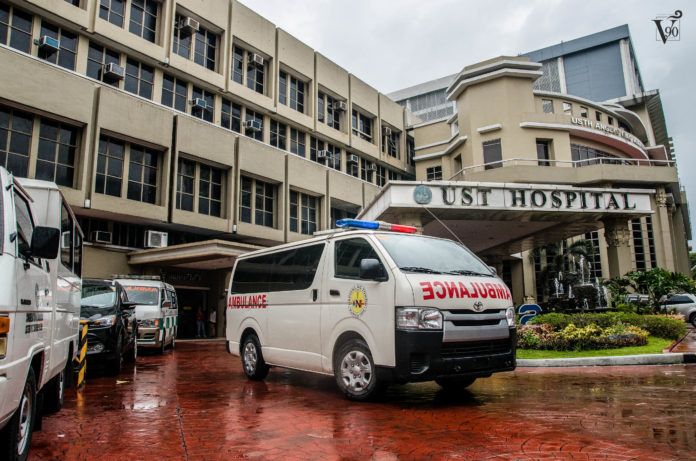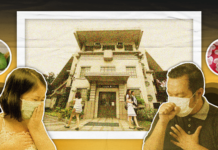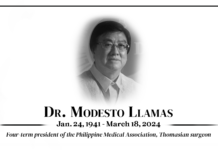THOMASIAN doctors commended the passage of the Universal Healthcare Bill in Senate but warned of major challenges ahead.
The Senate passed the measure on Oct. 10 with 14 senators voting in favor of the bill, while the House of Representatives passed its version back in 2017.
A bicameral conference committee would still reconcile the two versions.
UST alumnus Dr. Anthony Leachon, the independent director of Philhealth, said the government could not only depend on several institutions for the sustainability of the program.
“The government will face huge challenges in the deployment of resources [and] sustainable funds for universal healthcare which can’t be fully dependent on Pagcor, DSWD, PCSO and premiums from Philhealth,” he told the Varsitarian in an interview.
The government initially plans to fund the project with P100 billion annually, but Leachon projected that its cost would amount to about P250 billion to “achieve the universal healthcare’s goals.”
He stressed that if the bill became a law, it would need massive support from other departments of the government, with local government unit heads leading its implementation.
The biggest problem would be poor execution of the measure and the unwanted meddling of politicians in managing resources, he noted.
Dr. Benjamin Quito, a cardiologist from UST, expressed doubts as well if the proposed budget would be enough to cover the rising population.”
“I am not sure if that [would be enough]. Only Filipinos in developed areas gain access to what is ideal in terms of health care,” he told the Varsitarian in an interview.
Quito said the passage of the bill would allow Filipinos to have “access to basic and most complicated procedures necessary for a better quality of life.”
He lamented how the present healthcare system of the country is restrictive as not everyone could afford the cost.
“I see a lot of our countrymen forego their opportunity to have the proper treatment. For example, an emergency coronary angiogram with angioplasty would be life-saving in a patient with a life-threatening heart attack, but not all consent to avail of this treatment due to the cost,” Quito told the Varsitarian.
He added that hypertensive and heart failure patients fail to take their medications because of the expensive cost.
The bill seeks to register all Filipinos into a National Health Security Program, which replaces PhilHealth or the National Health Insurance Program.
Under the National Health Security Program, the membership will be either contributory or for those who can pay for their health premiums; or non-contributory or for senior citizens and the poor who would be shouldered by the government.
Funding
Health Secretary Francisco Duque III, a UST alumnus, has reportedly said that a major source of funds for the government’s flagship health program would come from sin taxes from cigarettes.
Sin tax is an excise tax imposed on cigarettes, gambling, alcohol and other things that may cause moral or medical harm.
Along with other Sin Tax Coalition members, Leachon lobbies for an initial increase of P30 to P60 in sin taxes to be able to fund the healthcare program, then on to an annual 9-percent increase.
Budget from sin tax incremental revenue stood at P111 billion for 2017 alone, and should the government double the taxes, the revenue would reach P200 billion, ex-Health secretary Paulyn Ubial noted in a talk in UST last year.
“The sin tax right now [of tobacco] is about less than P25 [and] one pack is about P50. If we double the tax, the cigarette will cost around P75 and we will get an additional P100 billion in the budget,” she explained.
Quito said increasing sin tax for additional budget on the healthcare program could also discourage cigarette smokers and said he hopes the budget would reach the right places.
“I hope that when the bill becomes a law, physicians would have the autonomy to decide what is best for their patients. I hope that the funds would be put to the proper hands, free of corruption,” he said.
Dr. Anita Sangalang, an obstetrics gynecologist and assistant professor at the UST Faculty of Pharmacy, stressed the important role of the government in realizing a successful universal health care in the country, with the bill as a start.
“As [the bill says], it is making healthcare accessibility equal to all Filipinos… [I]t will require a very efficient health care system [by the government] for it to run smoothly,” she told the Varsitarian.
Healthcare for the indigenous
Quito claimed that the country’s health care system would often forget the indigenous groups located in remote areas.
“Most of the country’s health budget I think is allocated in developed areas. Filipinos in developed areas gain access to what is ideal in terms of health care. Health professionals often forget our indigenous brothers and sisters in the mountain,” he said.
Leachon said under the bill, the “poor and those in the GIDA (Geographically Isolated and Disadvantaged Areas)” would have access to health care, with a transition time of five to 10 years before the goals of universal healthcare could be realized.
The bill seeks to link referrals and health care services in cities and provinces nationwide, and put more hospital beds, equipment and hospitals in distant areas.
It also seeks to improve the current doctor-to-patient ratio, which is one doctor to 33,000 patients as recorded by the Department of Health.
Former Kabayan partylist representative Harry Roque Jr. authored the Lower House’s version of the measure, while Sen. JV Ejercito authored the Senate version, as chairman of the Health and Demography committee.














